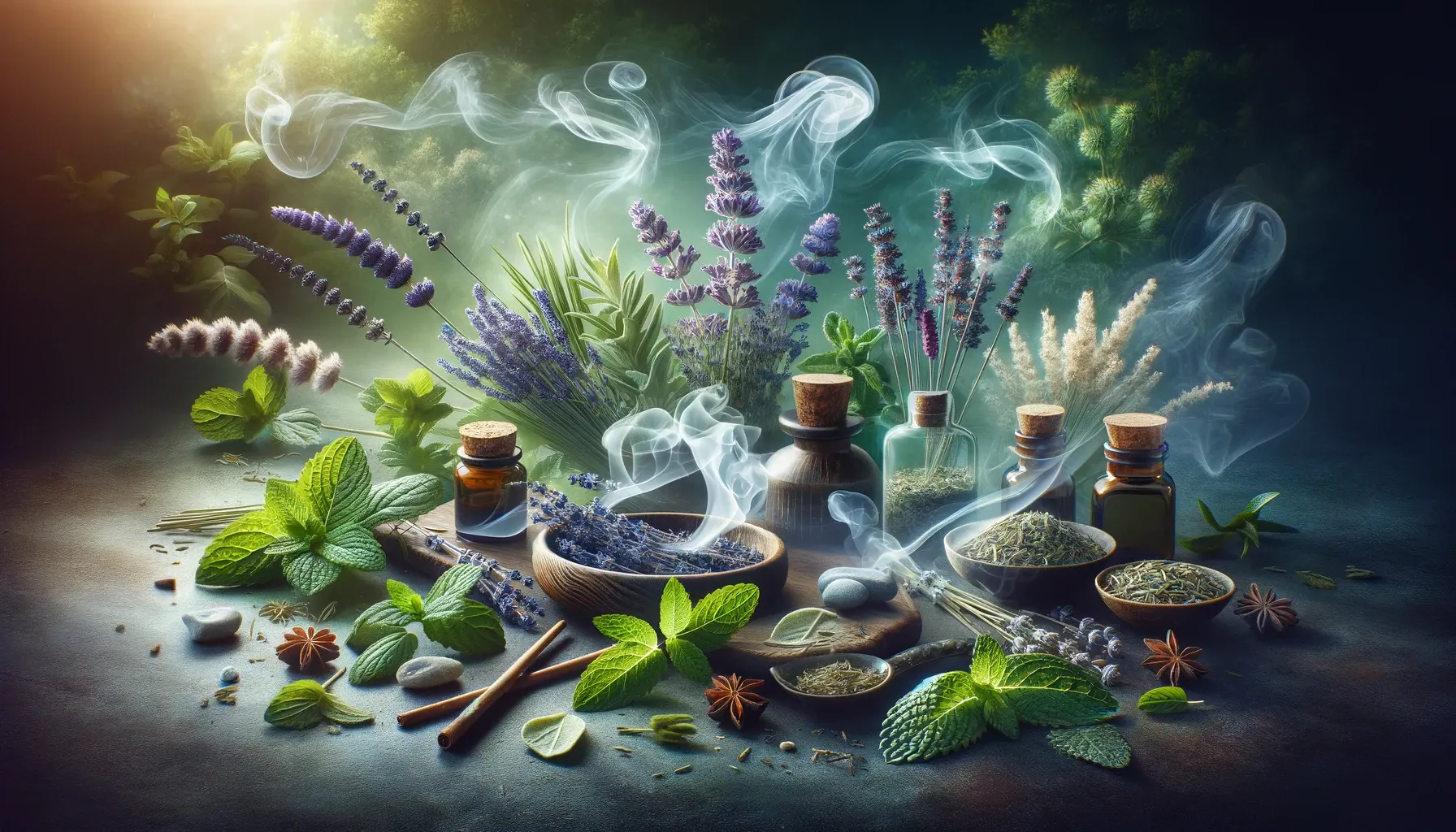Herbal Inhalation: A Health Perspective on Smoking Natural Herbs

In recent years, there's been a noticeable shift towards natural and holistic wellness practices, with more people exploring the ancient tradition of smoking herbs. This practice goes beyond the well-trodden paths of tobacco and cannabis, delving into a variety of botanicals known for their unique flavors, aromas, and purported health benefits. Today, we embark on a journey through the world of smoking herbs, exploring their historical roots, benefits, and how you can incorporate them into your life.
A few years ago, I began my journey away from tobacco, seeking a healthier alternative, which led me to the discovery of smoking herbs. My initial foray into this world started with sage, and I was immediately captivated by its purifying qualities and delightful aroma. Quickly, I learned about the diversity of herbs available, each capable of evoking different mental states. For instance, I found chamomile to be an excellent choice for relaxation before sleep, while peppermint served as a refreshing start to my mornings.
This transition not only allowed me to leave tobacco behind but also introduced me and many of my friends to the myriad of mental and physical benefits that herbal blends offer. Many of my friends took it to another level and made their own unique herbal blends. They've become more than just substitutes for cigarettes; they stand as beneficial on their own, offering a range of advantages for both mind and body.
Historical Context

The tradition of smoking herbs spans thousands of years, with evidence pointing to ancient civilizations in Asia, the Americas, and Africa using plants in ceremonial, medicinal, and recreational contexts. Herbs like sage, lavender, and mugwort were not only valued for their aromatic qualities but were also believed to possess healing properties, ward off evil spirits, and enhance spiritual practices.
Types of Smoking Herbs
The practice of smoking herbs extends beyond mere relaxation or habit; it is a gateway to understanding the intricate balance between body, mind, and spirit. Each herb, with its unique properties and aromas, offers a distinct experience. Here, we delve deeper into the well-known and the less explored, highlighting their potential health benefits and spiritual resonance.
Lavender: A Symphony of Calm

Lavender, with its enchanting aroma, is a herald of tranquility. Renowned for its ability to alleviate anxiety and promote peaceful sleep, smoking lavender can also offer a gentle relief from respiratory inflammation. Spiritually, lavender is believed to foster an environment of protection and love, facilitating inner peace and spiritual healing.
Mugwort: The Dream Weaver
Mugwort stands as a bridge to the subconscious, enhancing dreams and stirring mild psychoactive experiences. Beyond its dream-enhancing qualities, mugwort has been used to support digestive health and alleviate menstrual discomfort. Spiritually, it is associated with the moon and is used to protect and enhance psychic abilities, serving as a tool for spiritual introspection and lucid dreaming.
Damiana: The Mood Alchemist
Damiana, revered for its aphrodisiac properties, is also a mood enhancer, offering a sense of emotional upliftment and a subtle boost in energy levels. It has been utilized in traditional medicine to support mental and physical stamina, and to treat mild depression. On a spiritual level, Damiana is said to open the heart chakra, enhancing emotional connections and fostering a sense of harmony and attraction.
Sage: The Sacred Purifier
Sage, more than just a culinary herb, is a powerful agent for mood improvement and cognitive function. Smoking sage can offer antioxidant benefits, potentially supporting respiratory health and mitigating oxidative stress. Spiritually, sage is synonymous with cleansing and protection, used to ward off negative energy and enhance wisdom and clarity. It is a staple in many sacred rituals, connecting the physical to the spiritual realm.

Chamomile: The Gentle Soother
Chamomile, often associated with tea, when smoked, provides a gentle soothing effect. It can help ease anxiety, promote relaxation, and support digestive health. Its anti-inflammatory properties make it a kind ally for those with respiratory issues. Spiritually, chamomile is used to attract prosperity and protection, while also promoting spiritual purity and peace.
Additional Herbs to Explore:
- Peppermint: Known for its invigorating scent, peppermint can enhance energy and mental clarity. It supports digestive health and can provide relief from headaches. Spiritually, peppermint is used for purification, healing, and to invigorate love and passion.
- Rosemary: Beyond its culinary acclaim, rosemary smoked can improve memory, concentration, and digestion. It has been used for its antimicrobial properties. Spiritually, rosemary is associated with remembrance, protection, and love, often used to cleanse the mind and invigorate the soul.
- Calea Zacatechichi (Dream Herb): This herb is traditionally used to enhance dream recall and clarity, offering a gateway to vivid dreamscapes. It may also support respiratory health. Spiritually, Calea Zacatechichi is used for divination and to receive messages from the spiritual world in dreams.
- Roses and flowers: Incorporating the beauty and essence of the garden into the practice of smoking herbs, roses, and other flowers offer a unique and aromatic experience. Smoking rose petals, known for their soothing and uplifting properties, can add a floral note to herbal blends, enhancing the sensory enjoyment and potentially providing mild relaxation benefits.
I smoked also lemon balm, nettles, raspberry leaves, calendula and many more. You should find your unique herb or blend that resonates with your preferences.
Embracing the Essence
The tradition of smoking herbs is as diverse as the botanical world itself. Each herb carries with it a history of healing, spiritual significance, and a unique bouquet of benefits. Whether seeking to calm the mind, enhance spiritual practice, or explore the depths of dreams, the world of smoking herbs offers a rich tapestry of natural remedies and spiritual allies. As we navigate this ancient practice, it's essential to approach with respect, mindfulness, and an openness to the profound connections it can awaken within us.
Benefits of Smoking Herbs

In the quest for natural wellness alternatives, smoking certain herbs has emerged as a practice steeped in tradition, yet intriguing to the modern seeker. This approach to herbal consumption is not without its cautionary notes, given the inherent risks of inhaling smoke. However, the potential benefits attributed to this ancient practice offer a compelling narrative for those exploring natural methods to enhance their well-being. Here's an overview of the general benefits often associated with smoking herbs, framed within the context of holistic health and mindful usage.
- Natural Stress Relief and Relaxation
One of the most sought-after benefits of smoking herbs is their ability to provide natural stress relief and relaxation. Many individuals report a sense of calm and a decrease in anxiety levels, attributed to the natural compounds found in various herbs. This relaxation effect is often immediate, offering a temporary respite from the stresses of daily life.
- Potential Aid in Sleep and Insomnia
For those struggling with sleep disturbances or insomnia, certain herbal smokes are said to promote better sleep quality. The soothing effects of these herbs can help ease the mind into a more relaxed state, conducive to falling asleep and maintaining restful sleep throughout the night.
- Mood Enhancement
Herbal smoking can also have a mood-enhancing effect, lifting spirits and providing a sense of well-being. This benefit is particularly valued in herbs known for their uplifting properties, offering a natural way to boost one's mood without the use of synthetic chemicals or pharmaceuticals.
- Ritual and Mindfulness
Beyond the physical benefits, smoking herbs can serve as a ritual that promotes mindfulness and present-moment awareness. The act itself encourages a pause, a moment of reflection or meditation, which can be beneficial in today's fast-paced world. This ritualistic aspect can enhance spiritual well-being and provide a deeper connection to oneself and the environment.

- Alternative to Tobacco
For those looking to reduce or quit tobacco use, herbal smoking presents an alternative that is often perceived as less addictive and harmful. While this transition can offer a change in habit, it's essential to approach with an understanding of the differences and potential risks involved.
Nutrient Delivery Through Herbal Smoke
While the act of smoking inherently involves combustion, which can alter the chemical composition of herbs, it is proposed that some beneficial compounds found in herbs may be inhaled in this process. These compounds can include a range of essential oils, terpenes, and antioxidants that are inherent to the plant material:
- Essential Oils and Terpenes: Many herbs release aromatic compounds when smoked, which are not only responsible for their distinct fragrances but may also offer therapeutic benefits. For example, terpenes, which are found in lavender and sage, have been studied for their potential to interact with brain receptors to induce relaxation and stress relief.
- Antioxidants: Some herbs are known for their high antioxidant content, which can help combat oxidative stress in the body. While the efficiency of absorbing these antioxidants through smoke is less understood and likely lower than through ingestion, there is interest in the possibility that small amounts could contribute to the herb's overall beneficial effects.
Enhancing Holistic Well-Being
Incorporating the potential nutrient delivery aspect, smoking herbs can be seen as a practice that might offer more than just psychological or spiritual benefits. It suggests a complex interaction between the compounds in herbs and the body's physiological responses, albeit nuanced by the method of delivery and individual health considerations.
Smoke Only from Organic Trusted Sources

In the realm of smoking herbs, the significance of using organic, chemical-free herbs from trusted sources cannot be overstressed. Engaging with this ancient practice brings not only potential benefits but also responsibilities, particularly in ensuring the purity and safety of the herbs one chooses to inhale. Organic herbs, grown without the use of synthetic pesticides, herbicides, or fertilizers, are essential to minimize exposure to harmful chemicals that could negate the natural wellness benefits sought from smoking herbs.
Furthermore, sourcing herbs from reputable providers guarantees that the plants have been cultivated and harvested under conditions that preserve their medicinal qualities and aromatic integrity. This careful selection process is pivotal, as it directly impacts the efficacy, safety, and overall experience of smoking herbs. It underscores a commitment to not only personal health but also to environmental stewardship, supporting practices that maintain the earth's biodiversity and ecological balance. In essence, the act of choosing organic and responsibly sourced herbs is a foundational step in the holistic approach to smoking herbs, ensuring that this practice remains a positive and health-conscious choice.
While the practice of smoking herbs offers a natural avenue for relaxation and spiritual connection, it's imperative to navigate this path with awareness of its inherent risks and considerations. The act of smoking, regardless of the material, introduces smoke into the lungs, which can lead to respiratory irritation and potentially exacerbate or contribute to lung and cardiovascular conditions over time. Even when using organic and chemical-free herbs, the combustion process creates tar and other byproducts that may impact health. It is also crucial to consider individual health conditions and sensitivities, as certain herbs can interact with medications or trigger allergic reactions in susceptible individuals.
Growing and Drying your Own Herbs

Growing and drying your own herbs is a rewarding endeavor that brings you closer to the natural world and enhances your wellness practices. Cultivating herbs in your garden or even in small containers on a windowsill not only provides you with a sustainable source of ingredients for smoking blends but also allows you to control the growing conditions, ensuring they are free from harmful chemicals and pesticides. The process of nurturing these plants from seed to harvest can be a meditative and educational experience, deepening your connection to the herbs you use.
Once harvested, the drying process is crucial for preserving the herbs' aromatic properties and potency. This can be done through air drying, which is a simple yet effective method, or using a dehydrator for faster results. By growing and drying your own herbs, you guarantee the purity and quality of your blends, creating a more personal and intimate experience with the plants that support your health and wellbeing.
How to Smoke Herbs

Smoking herbs can be done using rolling papers, pipes, or vaporizers designed for herbal use. When creating your blends, start with a base herb like mullein or sage for smoothness and add other herbs according to the desired effect and flavor. Here are a few tips for a better smoking experience:
- Grind the herbs finely for an even burn.
- Experiment with blends, but start small to gauge their effects.
- Always ensure your smoking apparatus is clean to enjoy the pure flavors of the herbs.
Conclusion
The world of smoking herbs is rich with history, culture, and potential benefits. Whether you're seeking an alternative to tobacco, exploring natural ways to relax, or simply curious about herbal traditions, smoking herbs offers a unique avenue to explore. However, it's vital to approach this practice with mindfulness and respect for the plants and your body. As with any wellness practice, moderation is key, and informed choices make for a healthier journey.
We invite you to share your thoughts and experiences with smoking herbs in the comments below. Have you tried any of the herbs mentioned? Do you have a favorite blend or smoking ritual? Let's create a community of knowledge and respect for these ancient practices.
FAQs on Smoking Herbs
Q1: Can smoking herbs really help me quit tobacco?
A1: Many people have found smoking herbs to be a beneficial alternative to tobacco, citing fewer cravings and a more satisfying experience without nicotine. However, success varies from person to person, and it's important to approach the transition with mindfulness and moderation.
Q2: Are there any health risks associated with smoking herbs?
A2: While smoking herbs can offer various benefits, inhaling smoke of any kind can irritate the respiratory system. It's crucial to use organic, chemical-free herbs and to be aware of personal health conditions that might be affected by smoking.
Q3: How do I know which herbs are safe to smoke?
A3: Research and sourcing from reputable providers are key. Look for herbs that have been traditionally smoked and are sold by trusted suppliers. If in doubt, consult with a healthcare professional or a knowledgeable herbalist.
Q4: Can smoking herbs have psychoactive effects?
A4: Some herbs, like mugwort and damiana, are known for their mild psychoactive effects, such as enhancing dreams or uplifting mood. However, these effects are generally milder compared to substances like cannabis.
Q5: How can I start smoking herbs? What do I need?
A5: Starting with a simple herb like sage or chamomile is a good idea. You'll need rolling papers, a pipe, or a vaporizer designed for herbal use. Begin with small amounts to gauge your body's response.

